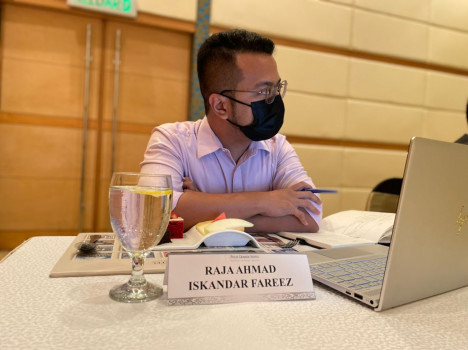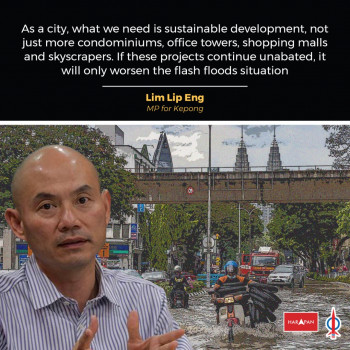By Chong Lip Teck, translated by Soong Phui Jee
 The country has been experiencing an extremely hot weather recently and even it rained on the Chap Goh Meh, the rains poured with pollutants and it did not help much in raising dam’s water level. The water level has reached a record low and if the situation worsens, it could lead to another water shortage crisis!
The country has been experiencing an extremely hot weather recently and even it rained on the Chap Goh Meh, the rains poured with pollutants and it did not help much in raising dam’s water level. The water level has reached a record low and if the situation worsens, it could lead to another water shortage crisis!
Klang Valley residents will never forget about the severe water shortage crisis in 1998. Everyone had to rush for water everyday and even today, they became so worried whenever there was a water supply disruption, even for only a short period of time. Life without water is troublesome for the general public while it also greatly affects businesses, causing losses.
In fact, not only Malaysians who have to face the bitterness of water supply disruption every year, but it has become one of the world’s most important issues. One of the reasons is inseparable from climate change. The phenomenon of extreme climate has caused some places, where originally blessed with pleasant climate and abundant rainfall, to face all kinds of plights, including little rainfall and drought.
In addition to climate change, agricultural irrigation needs a large amount of fresh water while energy production also needs to rely on fresh water, including power generation system and the cracking of petroleum and gas wells. Population growth also raises the demand for potable water.
Human daily activities and production process require a lot of water. However, humans waste and contaminate water while heavily relying on it. When we encounter water shortage, instead of blaming the dry weather, we should actually reflect and ask ourselves whether we have played our role in saving water, and whether we have caused water contamination, turning some potable water into contaminated water that is no longer safe for drinking. Water shortages are actually a bitter fruit of human’s doing!
A recent report wrote that the data obtained by Nasa from the Grace Satellites showed that California has been in the edge of severe drought and the backup groundwater reserve system has depleted. At the same time, California Governor Jerry Brown declared a drought emergency in January, calling the people of California to reduce water consumption by 20%.
Even more alarming, according to the data collected by Grace Satellites and revealed last year, in seven years starting from 2003, Turkey, Syria, Iraq, Iran, the Tigris and Euphrates have lost a total of 144 cubic kilometres of inventory fresh water, abut the water quantity of Dead Sea.
The loss of water reserves was partly due to the drought and lack of snow in 2007 and another part was because the evaporation of lake and reservoir water. However, the vast majority of water lost, amounting to 90 cubic kilometres or about 60%, was due to the reduction of groundwater. Where has the groundwater gone? The water has been used for agricultural irrigation by farmers facing drought while residents of some places also dug wells to get freshwater. These have worsen the already serious water shortage problem.
We should address the potential crisis before it is too late, particularly Selangor residents are enjoying free water, they should use water wisely and not to waste it because it is free. The lesson learned in 1998 should not be forgotten and it is now the time to finalise the water management issue between the Selangor state government, water supply company and federal government.
The Selangor water management issue has been politicised and more utility issues are expected to become means of political struggles. It could be a good thing if the struggle between the ruling and alternative coalitions is for the welfare of the people instead of their own political interests. However, once it is used to achieve personal agenda while sacrificing the people’s interests, they should then get prepared to face public judgement!
* The views expressed in this article are the personal opininion of the columnist and this article first appeared in mysinchew.com



